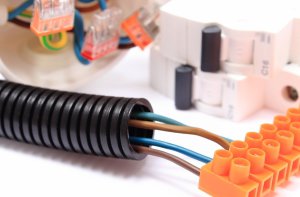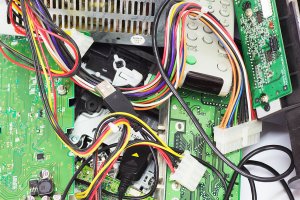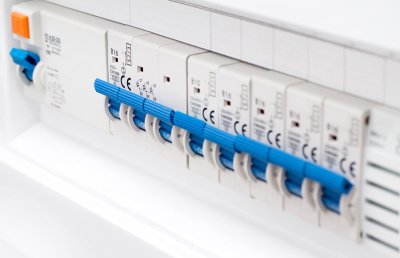-
Circuit Breakers 101
Circuit breakers are designed to shut off power to a circuit if an electrical surge is detected. This video will provide you with some essential information about the circuit breakers in your home. When your circuit breakers are tripped, it will be up to you to turn the power back on. For example, if a single GFCI socket has been tripped, you will be able to reset the power on the outlet, itself. An electrician serving San Jose can answer your questions about circuit breaker safety.
If you have noticed that your circuit breakers are tripping frequently, it may be time to hire a residential electrician. An electrician can address issues in your electrical panel, and recommend any necessary updates or repairs. Rewiring certain areas of your home will help to prevent your home’s outlets from getting overloaded.
-
A Look at How Fuses Work
Fuses, like circuit breakers, are designed to protect electrical wiring in San Jose by interrupting excessive electrical currents caused by, among others: overloaded outlets, malfunctioning devices, and short circuits. Though they may be rather simple things, fuses provide a very important service. Here’s a look at how they work.
How Fuses Work
Like the filament in an incandescent light bulb, fuses have thin wires that electricity can flow through. These wires are designed to carry a specific amount of electricity safely—the thicker the wire, the higher the current it can support. When an excessive electrical current attempts to pass through this wire, it heats up the wire to the point of melting or burning. This destroys the wire and interrupts the circuit. In the case of burning, the wire gets very hot very quickly, and it blows out, producing a loud and characteristic popping sound. When a fuse is blown, it needs to be replaced.
wires are designed to carry a specific amount of electricity safely—the thicker the wire, the higher the current it can support. When an excessive electrical current attempts to pass through this wire, it heats up the wire to the point of melting or burning. This destroys the wire and interrupts the circuit. In the case of burning, the wire gets very hot very quickly, and it blows out, producing a loud and characteristic popping sound. When a fuse is blown, it needs to be replaced.Which Size to Use
Fuses come in a range of sizes and amperages. Generally, you want to replace a blown fuse with one that has a similar rating—i.e. a five-amp fuse with a five-amp fuse. If you’re not sure which kind of fuse to use, you can use your discretion based on logic. Since large appliances and devices tend to need more electricity to operate, they most likely require larger fuses. Likewise, smaller devices require smaller fuses. If you’re uncomfortable making a decision, contact a qualified electrician for assistance. Using a small fuse for something that draws a large current will blow out the fuse quickly. Using a large fuse for something that draws a small current will overwhelm it and can cause a dangerous situation.How Fuses Differ From Circuit Breakers
Both fuses and circuit breakers protect homes from electrical mishaps. Unlike fuses, circuit breakers have reusable mechanisms that, when tripped, cut-off power to outlets. These mechanisms can be easily reset once they are tripped. Circuit breakers can also be used in conjunction with ground-fault circuit interrupters (GFCI). Fuses are the more economical choice of the two. They are more sensitive than circuit breakers, which may or may not be useful depending on their application. They also tend to be more prominent in older homes. -
Replacing a Faulty Circuit
A functioning circuit breaker in San Jose will prevent your appliances from using a dangerous amount of energy, but it cannot perform this task unless all of its circuits are working. The good news is that fixing the problem is relatively simple and straightforward. Watch this video clip for tips on replacing a faulty circuit.
The first step in replacing a faulty circuit is locating the breaker box. Once you have found your breaker box, open it up and turn off the main; this is a very important step that should never be skipped over. Unscrew and remove the panel and loosen the screw that holds the wire, then remove the circuit breaker itself. Now you can simply insert the new circuit breaker and tighten the screws, put the lid back on, and turn on the main breaker. Your circuit breaker should now be functioning at optimal capacity once again.
-
Home Electrical Issues: Why Do Your Circuits Keep Tripping?
It is tempting to become frustrated with your circuit breaker in San Jose if it continues to trip, but it helps to keep in mind that you are on the same team. Your breaker box can keep you safe in the event that your appliances attempt to draw too much power through your electrical system; instead of hazardous consequences like fires, your system will shut down and recover. Keep reading if you would like to find out why your circuits keep tripping.
Overload
Your circuits trip in order to prevent excessive amounts of electricity from flowing and creating too much energy, and in many cases this occurs when someone attempts to use too many appliances at the same time . It is important to note that circuits and outlets are different things; just because your appliances are plugged into different outlets does not mean that they are operating on different circuits. Always consider the amount of power that any given appliance uses, and make sure you do not attempt to use a variety of other appliances at the same time. Sometimes circuits will trip in this manner because of loose connections, but you should always have a licensed electrician address these issues.
in many cases this occurs when someone attempts to use too many appliances at the same time . It is important to note that circuits and outlets are different things; just because your appliances are plugged into different outlets does not mean that they are operating on different circuits. Always consider the amount of power that any given appliance uses, and make sure you do not attempt to use a variety of other appliances at the same time. Sometimes circuits will trip in this manner because of loose connections, but you should always have a licensed electrician address these issues.Ground Fault
If you are not using too many appliances at the same time, your tripping circuit problem may have to do with a ground fault. When a hot wire touches a ground wire, a ground fault occurs; the same can happen when the hot wire touches a metal outlet box. Diagnosing this problem is simple, as all you have to do is make sure that the hot wire is not touching either of these other elements. A ground fault is one example of a short circuit.Short Circuit
When a hot wire touches a ground wire or metal outlet box, a ground fault occurs; this is because whenever a hot wire touches a hot or neutral wire, a short circuit results. Short circuits tend to be more severe than circuit overloads and can involve melted cords, so in this case it is wise to have a professional electrician take a look at your electrical system. -
Understanding the Importance of Your Circuit Breaker
Some people may still call them “fuse boxes,” though most homes and office buildings have circuit breakers in San Jose. These panels are crucial to the function of any modern building, since they prevent circuits from overloading, which in turn prevents damage to the wiring and electrical fires. Only a licensed electrician should attempt to repair or replace a circuit breaker . Find out more about this critical piece of electrical equipment by reading on.
Modern Circuit Breaker Design
The original design for home electrical panels were indeed fuse boxes. Fuses contained filaments that would melt when overheated, interrupting the circuit and preventing a fire or overload. Fuses needed to be thrown out and completely replaced when they “blew out,” so homeowners needed to keep a supply of them on hand or call a residential electrician when this happened. Modern circuit breakers contain switches that trip, allowing you to restart the circuit simply by flipping the switch.
breakers contain switches that trip, allowing you to restart the circuit simply by flipping the switch.Signs of a Circuit Breaker Problem
If you find that breakers in your home or commercial property frequently trip, cutting off power to a certain section of the building, you should call an electrician for an electric safety inspection as soon as you can. This can be a sign of faulty wiring or an overloaded breaker. Beyond the inconvenience of constantly having to visit the breaker box to flip the switches, these problems can lead to sparking, electrical fires, and other serious dangers. The circuit breaker should be a safety feature, not a safety hazard.Solutions for Breaker Problems.
Often, an electrician can fix your breaker problems simply by rewiring the panel. In some cases, however, your building may need electrical panel upgrades. Today’s electrical usage, with computers, phone chargers, televisions, broadband routers, and much more, far exceeds that of even two decades ago. To bring you up to code, an electrician may install smaller sub-panels, or upgrade your circuit breaker to a larger size that can handle the increased load on the system. -
Issues That Require an Electrician [INFOGRAPHIC]
If you’re like many people, chances are you don’t give much thought to your home’s electrical system—unless something is going wrong. You rely on electricity in your house to get you through your day, so if there is a malfunction, it can be frustrating and inconvenient. Many common electrical issues can be fixed with relative ease by a residential electrician near San Jose . If you have an electrical outlet that no longer works, an electrician can replace it for you to greatly reduce the risk of an electrical fire. Too many appliances working at the same time can overload a circuit, so ask an electrician about installing a separate circuit to avoid this hassle. Take a look at this infographic to learn more about common electrical problems that require the attention of an electrician. Please feel free to share this info with your friends and neighbors!

-
A Look at Electrical Wiring Codes
The electrical power used by your home is a complex system that makes use of many components including electric panels, dedicated circuits, and circuit breakers in San Jose. If any electrical components are installed or maintained improperly, severe consequences may result. Watch this video clip for a look at electrical wiring codes.
Residential electrical wiring codes ensure that your home is powered consistently and wired safely in order to minimize your chances of experiencing fires, short circuits, or other potential dangers. There are different factors in play when it comes to electrical wiring inside the home, especially considering the varying amounts of voltages that different appliances use. In the case of a home renovation or a home construction there are certain tasks that homeowners may perform and there are other tasks that can only be handled by a licensed electrician. You can find out about these specific tasks by contacting your local building codes department.
RECENT POSTS
categories
- Uncategorized
- Delta Electric
- Commercial Electrical
- Residential Electrical
- Electric Circuits
- Dedicated Circuits
- Circuit Breakers
- Electrical Panels
- Electrical Wiring
- Safety Inspections
- copper wires
- Electrician San Jose
- Trained Electricians
- Electrical Services San Jose
- Malfunctioning Electrical Outlets
- Circuit Breaker
- Grounding
- safety
- Flickering Lights
- Arc Fault Breakers
- electrical system
- Aluminum Wiring
- Circuit Interrupters
- House Surge Protection
- Zinsco Panel Warnings
- Wiring Conversion
- GFCI outlet
- professional electrician
- Knob-and-Tube Wiring
- modern home electrical system
- Fuses
Archives
2025
2024
2023
2018
2017
- December (4)
- November (4)
- October (5)
- September (4)
- August (4)
- July (4)
- June (4)
- May (4)
- April (4)
- March (3)
- February (4)
- January (3)
2016
- December (3)
- November (4)
- October (4)
- September (4)
- August (4)
- July (4)
- June (4)
- May (4)
- April (4)
- March (4)
- February (4)
- January (4)
2015
- December (4)
- November (4)
- October (4)
- September (4)
- August (3)
- July (4)
- June (4)
- May (3)
- April (4)
- March (4)
- February (2)
2014
- December (3)
- November (4)
- October (4)
- September (6)
- August (2)
- July (3)
- May (2)
- April (1)
- March (2)
- February (1)
- January (1)

